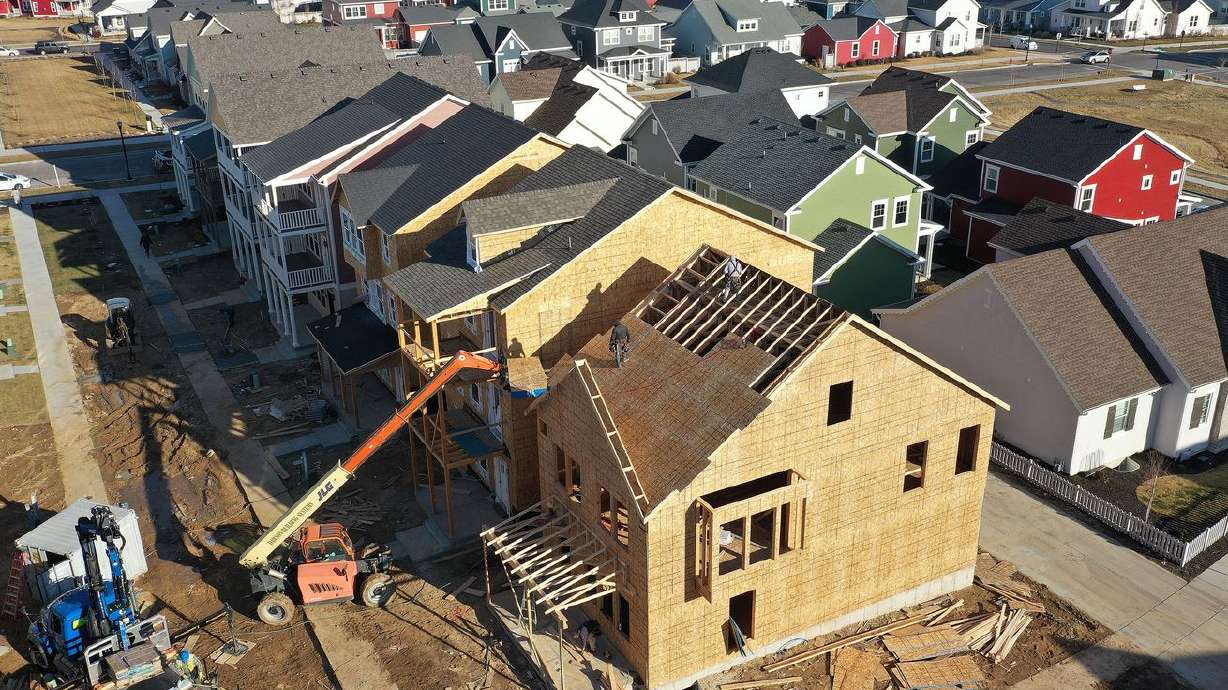Estimated read time: 4-5 minutes
This archived news story is available only for your personal, non-commercial use. Information in the story may be outdated or superseded by additional information. Reading or replaying the story in its archived form does not constitute a republication of the story.
SALT LAKE CITY — Utahns are more concerned about growth than at any point in the last 25 years.
Depending on the metric, Utah is typically one of the fastest, if not the fastest, growing state in the country. But new research suggests 2 in 5 Utahns believe future growth will lead to a declining quality of life.
Since the 2010 census, the Beehive State's population inflated by 18.4%, the largest increase in the U.S. Between 2020 and 2021, the four fastest growing states were all in the Intermountain West — Idaho led the pack with 2.9% growth. Utah and Montana tied for second at 1.7%, followed by Arizona at 1.4%.
A survey conducted by Envision Utah found that many Utahns aren't excited about the population boom. About 42% of respondents think future growth will make the state worse — 13% said "a lot worse," and 30% said "a little worse."
Meanwhile, 36% said it will make the state better, with only 7% saying it will improve quality of life in Utah by "a lot."
About 22% answered "neither."
"Utahns are more concerned about growth than any point that we have seen," said Jason Brown with Envision Utah, a nonprofit that seeks "a holistic, balanced approach to the future," according to its website.
The group conducted the survey of 800 Utahns over 18 years old. It has a margin of error of plus or minus 3.5 percentage points.
Demographic data suggests white, conservative voters between the ages of 56 to 76 are the most concerned about the state's growth. Of those who said it would make Utah worse (and with some crossover between the characteristics), 53% are conservative, 49% have lived in Utah for over 30 years, 48% are baby boomers, 46% are white and 45% live in the suburbs.
Of the respondents who said growth will improve the quality of life in Utah, 44% are Democrats, 42% live in urban areas and 41% are men, college graduates and/or live in a high-income household.
Some of the perceived negative consequences of growth are the increasing costs of housing and housing shortages, traffic concerns, environmental harm like declining air quality or habitat loss, and increased crime.
Things like changes to habits and practices, a growing religious divide and racial tensions ranked relatively low on the list of concerns.
Meanwhile, Utahns who view the population boom as a positive listed increased economic opportunity and the growing number of jobs, more cultural diversity and better funding for education as benefits. Better public transportation and increased tax revenue and property values came in last.
'We cannot let our state become California'
During a meeting with the Deseret News/KSL editorial boards Monday, representatives from Envision Utah echoed a message similar to what Utah Gov. Spencer Cox said in his second State of the State address last week — "we cannot let our state become California."
Cox specifically urged lawmakers to support legislation aimed at stripping government regulations that result in higher housing prices, telling the audience "we can increase supply without decreasing quality of life."
But the survey points to an increasing number of Utahns who say not only is growth bad, but it should be stopped. That sentiment can sometimes result in opposition toward zoning measures and loosened regulations that, as the governor says, would "increase supply."
Roughly 23% of respondents say growth jeopardizes the quality of life and that the state and its residents should try to stop or slow the influx of people.
"This was concerning to us. This is not something we've seen before," said Brown with Envision Utah.
Brown pointed to communities in California as an example where "negative feelings about growth lead to ideas around stopping growth," which in some instances resulted in state legislatures taking zoning power away from local governments.
In September, California Gov. Gavin Newsom signed several bills that overstepped local zoning regulations to allow higher density housing, according to the L.A. Times. In some neighborhoods previously zoned for standalone homes, the new laws will allow up to four units on a single property.
Resistance to growth, Brown said, can also lead to rising housing prices, which is ironically a reason many communities are resistant in the first place.
"There's been long-held efforts to try and stop or limit growth and it hasn't worked out super well for them. It's driven the cost of housing really, really high," said Brown of certain communities in California.
Still, 12% of respondents who said growth poses a threat to the quality of life in Utah admit stopping it would not be in the best interest of the state.
And 28% say that growth brings benefits to Utah, and should not be hindered.









